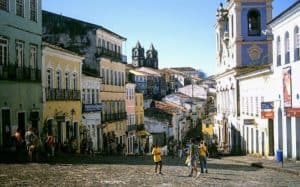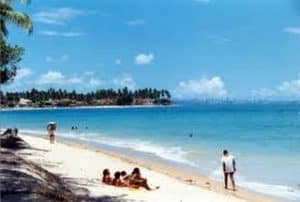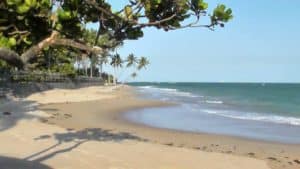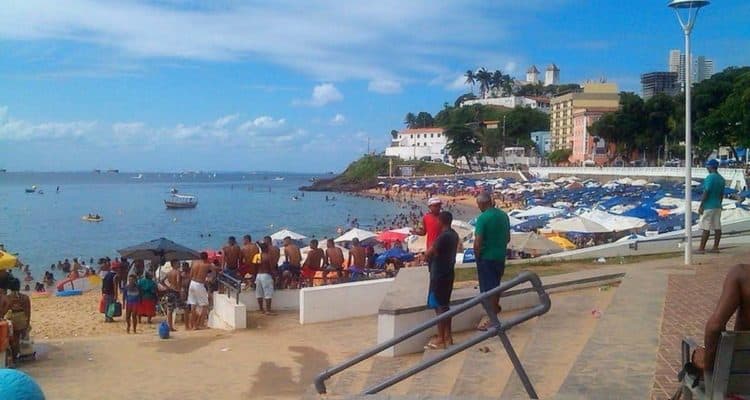
Salvador was the first historic capital of Brazil since Governor the General Thome de Souza made it the seat of the royal administration in 1549. This by the order of João II of Portugal. Salvador played a leading economic and political role until 1763. Then the seat of administration was transferred to Rio de Janeiro. The city is built along a vast bay, named ‘the Bay of All Saints’. With a surface of 1,100 square kilometres it is the largest in Brazil.
The original part of Salvador lies elevated upon a ridge parallel to the Atlantic coast. This to make a strong city defence possible. Examples are the Spanish (1580) and Dutch attacks (1624). Amerigo Vespucci discovered the bay in 1502. The north and lower city with the port lost their pristine character due to a growing population. This growth excellerated from 1966 onwards as a result of industrial developments in the region. Nowadays the historic city is enclosed by a very dense urban zone.
The Pelourinho quarter.
Salvador de Bahia is a great example of Renaissance Urban Town planning adapted to the colonial origin. The historical centre itself revolves around the Pelourinho quarter. It is characterized by its fidelity to the 16th-century architectural plan, the density of its monuments, and the homogeneity of its construction on a hilly site. The urban scenery is embellished by steeply falling and ascending views of incomparable beauty. Pelourinho is characteristic for the colonial city. Its many streets lined with bright multicoloured houses, often decorated with high-quality stucco are a very special experience for lovers of postcolonial culture.
Salvador Itaparica Island

What one sees on the other side of the bay is the island of Itaparica. It is the largest of the 56 islands in the bay. There are two ways to get there easy. The ferryboat or the small boat (Pequena lancha). The pequena lancha is a pretty way unless you want to take a car with you.
Transportation on the island is available in the form of kombis, probably a word of German origin. Kombis were usually Volkswagen vans. Kombi vans are always waiting for customers at disembarkation points. They stop anywhere along the routes to drop off or pickup their passengers. There are also big bus corporates, running from Bom Despacho, the island’s ferry-boat landing point. Buses in Brazil offer a comfortable way of travelling. VIP buses offer affordable good quality for long-distance travel. A very cost friendly and enjoyable possibility with often splendid views on the countryside.

The beauty of Itaparica island
Well-known Brazilian writer João Ubaldo Ribeiro considered the island as “heaven on earth”. It has a wild beauty, a never-ending beach, calm sea, natural swimming-pools, mangroves, some small towns, being Bom Despacho, Itaparica and Vera Cruz, several pretty villages and everything set in lush nature. Both Itaparica town and Vera Cruz have a view on Salvador across the bay. The village of Aratuba is a pretty fishermen’s place on the Atlantic facing side of the island with beautiful sandy beaches. You can have a walk by the seaside, a good sunbath on the beach, a swim every now and then, sipping a cool drink and wait for a magnificent moon rise. Have a tasty “moqueca”, a well-known fish dish. The island is famous for its fish and seafood. Have a restful nap on the hammock or be simply in love with Itaparica and profit the best of life.
Salvador Itaparica food

Mentioned already is the tasty “moqueca” but also worth mentioning are the seafood soups called “caldos”. In case you aren’t a lover of these Brazilian specialities, you can always find an alternative dish nearby on the island, because many foreigners found their way to Itaparica island, bought their home in tropical surrounding and discovered that mixing with the island inhabitants is just one of these pleasant things in life.
From the moment of its discovery by Americus Vespucius, the Bay of all Saints has proofed to be an exceptionally attractive place on the Brazilian coast. On one side of the bay Salvador has developed its rich cultural blend within awesome colonial architecture and on the other side offers Itaparica the tranquillity of an island in lush nature, with peace and quietness to unwind in manners always appreciated since mankind exists. No wonder why so many people like to have their place under the sun on the Itaparica island.

